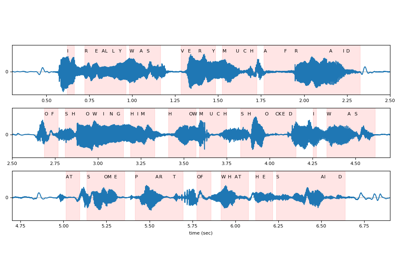CTCDecoder¶
- class torchaudio.models.decoder.CTCDecoder[source]¶
CTC beam search decoder from Flashlight [Kahn et al., 2022].
Note
To build the decoder, please use the factory function
ctc_decoder().- Tutorials using
CTCDecoder:
- Tutorials using
Methods¶
__call__¶
- CTCDecoder.__call__(emissions: FloatTensor, lengths: Optional[Tensor] = None) List[List[CTCHypothesis]][source]¶
Performs batched offline decoding.
Note
This method performs offline decoding in one go. To perform incremental decoding, please refer to
decode_step().- Parameters
emissions (torch.FloatTensor) – CPU tensor of shape (batch, frame, num_tokens) storing sequences of probability distribution over labels; output of acoustic model.
lengths (Tensor or None, optional) – CPU tensor of shape (batch, ) storing the valid length of in time axis of the output Tensor in each batch.
- Returns
List of sorted best hypotheses for each audio sequence in the batch.
- Return type
List[List[CTCHypothesis]]
decode_begin¶
- CTCDecoder.decode_begin()[source]¶
Initialize the internal state of the decoder.
See
decode_step()for the usage.Note
This method is required only when performing online decoding. It is not necessary when performing batch decoding with
__call__().
decode_end¶
- CTCDecoder.decode_end()[source]¶
Finalize the internal state of the decoder.
See
decode_step()for the usage.Note
This method is required only when performing online decoding. It is not necessary when performing batch decoding with
__call__().
decode_step¶
- CTCDecoder.decode_step(emissions: FloatTensor)[source]¶
Perform incremental decoding on top of the curent internal state.
Note
This method is required only when performing online decoding. It is not necessary when performing batch decoding with
__call__().- Parameters
emissions (torch.FloatTensor) – CPU tensor of shape (frame, num_tokens) storing sequences of probability distribution over labels; output of acoustic model.
Example
>>> decoder = torchaudio.models.decoder.ctc_decoder(...) >>> decoder.decode_begin() >>> decoder.decode_step(emission1) >>> decoder.decode_step(emission2) >>> decoder.decode_end() >>> result = decoder.get_final_hypothesis()
get_final_hypothesis¶
- CTCDecoder.get_final_hypothesis() List[CTCHypothesis][source]¶
Get the final hypothesis
- Returns
List of sorted best hypotheses.
- Return type
List[CTCHypothesis]
Note
This method is required only when performing online decoding. It is not necessary when performing batch decoding with
__call__().
idxs_to_tokens¶
Support Structures¶
CTCHypothesis¶
- class torchaudio.models.decoder.CTCHypothesis(tokens: torch.LongTensor, words: List[str], score: float, timesteps: torch.IntTensor)[source]¶
Represents hypothesis generated by CTC beam search decoder
CTCDecoder.- Tutorials using
CTCHypothesis:
- tokens: LongTensor¶
Predicted sequence of token IDs. Shape (L, ), where L is the length of the output sequence
- words: List[str]¶
List of predicted words.
Note
This attribute is only applicable if a lexicon is provided to the decoder. If decoding without a lexicon, it will be blank. Please refer to
tokensandidxs_to_tokens()instead.
- timesteps: IntTensor¶
Timesteps corresponding to the tokens. Shape (L, ), where L is the length of the output sequence
- Tutorials using
CTCDecoderLM¶
- class torchaudio.models.decoder.CTCDecoderLM[source]¶
Language model base class for creating custom language models to use with the decoder.
- Tutorials using
CTCDecoderLM:
- abstract start(start_with_nothing: bool) CTCDecoderLMState[source]¶
Initialize or reset the language model.
- Parameters
start_with_nothing (bool) – whether or not to start sentence with sil token.
- Returns
starting state
- Return type
- abstract score(state: CTCDecoderLMState, usr_token_idx: int) Tuple[CTCDecoderLMState, float][source]¶
Evaluate the language model based on the current LM state and new word.
- Parameters
state (CTCDecoderLMState) – current LM state
usr_token_idx (int) – index of the word
- Returns
- (CTCDecoderLMState, float)
- CTCDecoderLMState:
new LM state
- float:
score
- abstract finish(state: CTCDecoderLMState) Tuple[CTCDecoderLMState, float][source]¶
Evaluate end for language model based on current LM state.
- Parameters
state (CTCDecoderLMState) – current LM state
- Returns
- (CTCDecoderLMState, float)
- CTCDecoderLMState:
new LM state
- float:
score
- Tutorials using
CTCDecoderLMState¶
- class torchaudio.models.decoder.CTCDecoderLMState[source]¶
Language model state.
- Tutorials using
CTCDecoderLMState:
- property children: Dict[int, CTCDecoderLMState]¶
Map of indices to LM states
- child(usr_index: int) CTCDecoderLMState[source]¶
Returns child corresponding to usr_index, or creates and returns a new state if input index is not found.
- Parameters
usr_index (int) – index corresponding to child state
- Returns
child state corresponding to usr_index
- Return type
- compare(state: CTCDecoderLMState) CTCDecoderLMState[source]¶
Compare two language model states.
- Parameters
state (CTCDecoderLMState) – LM state to compare against
- Returns
0 if the states are the same, -1 if self is less, +1 if self is greater.
- Return type
- Tutorials using

